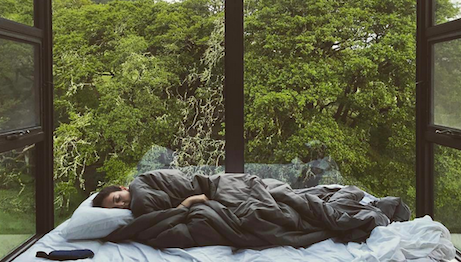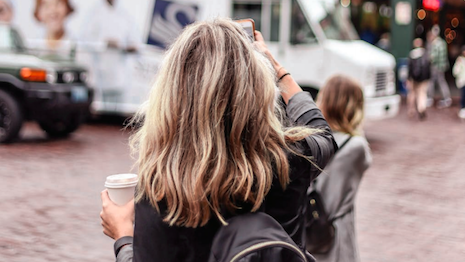Affluent millennials are pushing the envelope with constantly evolving travel trends, where visitors look to cities rather than tropical beach destinations.
Everlasting connectedness and growing technologies such as Uber and Airbnb have pushed travelers to be more comfortable in the new cities they travel to, feeling almost as if it were home. This notion, paired with a simultaneous desire to experience new things and an increase in safety, is pushing an interest in city exploration to the forefront of travel trends.
“One of the key takeaways from the study was discovering that of millennials, age 20-36, who traveled last year, 58 percent now have children and, therefore, the most popular type of trip millennial travelers are planning in 2018 is a vacation with kids," said Chris Fair, president of Resonance, New York. "At the same time, 25 percent of millennial travelers are planning on taking a vacation on their own in 2018, so we now have two very distinctly different types of travelers seeking different types of experiences within this demographic cohort.”
Millennials shaping travel
The 2018 Future of Millennial Travel Report is exhibiting just how much millennials are driving change in the travel sector.
Health and wellness have been at the forefront of travel with this consumer segment for a significant amount of time now and most participants in the survey said it is a component of their travel. About 71 percent of respondents claimed to enjoy health and fitness activities while away on vacation.
However, millennials are most interested in cultural events and performances followed by nightlife, at 74 percent and 76 percent, respectively.
Organic food is currently a vital part of wellness in travel, which was popularized by affluent millennials who were raised with easy access. The increase in wellness interest on vacation is likely due to millennials’ new ideas of what health is.
 Visitors at Canyon Ranch participate in wellness activities. Image credit: Canyon Ranch
Visitors at Canyon Ranch participate in wellness activities. Image credit: Canyon Ranch
For the millennial generation, wellness means happiness and being physically fit, while those outside the segment think of health as just “free from illness.”
The rise of social media and Instagram influencers has stimulated a never-ending quest for adventure in wealthy affluents, changing the travel scene. These thrill-seekers are now looking for the best way to impress their friends and followers by showing off the most unique activities while away.
Now that the adventure-junkie consumers have come of age and grown to have kids of their own, this has changed the dynamic of the family vacation as well.
Only 6 percent of total United States travelers were interested in traveling more in the coming year, but millennial families’ enthusiasm for it was drastically higher at 35 percent.
Group travel is becoming more popular now as well, with 34 percent of survey takers claiming to take multigenerational trips.
It may seem as though the sharing economy and services such as Airbnb have made the idea of staying at a hotel stale, but millennials’ interests still lie with full-service hotels. While 52 percent of millennials do take advantage of home rental services such as Airbnb, their number one venue of choice is a full-service hotel.
 Airbnb listing in Bennett Valley, California
Airbnb listing in Bennett Valley, California
Better booking services such as mobile check-in can help carry the hotel legacy brands into this new generation.
Additional insight
While 2017 was a solid year for luxury, 2018 is projected to see slight increases to total spending, with most of the growth coming from travel-related purchases.
This data comes from Luxury Institute’s annual study on the state of the luxury business, which surveyed thousands of affluent customers from the wealthiest nations in the world. The data supports the growing understanding that luxury consumers are beginning to value experiences over products (see more).
Also, according to another report from Virtuoso, cold destinations are set to be the top choice for affluent travelers in the upcoming year.
Iceland, Alaska, Antarctica and the Arctic are some of the top destinations travelers are looking to for trips in 2018. Consumers are searching for adventure in their travels, and the Northern Lights are significant part of that (see more).
“One of the most surprising findings from the study was that while more than 50 percent of millennial travelers regularly or occasionally use home-sharing services such as Airbnb, their preferred choice when it comes to accommodation is actually a full-service hotel, which suggests to us that the rapid rise and growth of Airbnb is likely to slow in the U.S. in the near future," Resonance's Mr. Fair said.
{"ct":"y7JuBhTwwgltmQ8z2WGxNx1HYyKDOagxJtHooJZlLHTcNfP8Xh8vEDTcITcMnGe\/za5ljglJh+2a65zt01fDNf6fuDf4mC8KUkSddpfIbCrR9Y8rpYj1c4GFmmyStdlnSRp+IIF8Anf8Y7wEybDft9i9\/aKJ8Ko+K4GoBCDJHAPclPvjQAwKLSEsozTsSwiKeTpCjDK6qCntb03+HUczMLCC52gHaRUUBVk+6fpSVJ9DNpaFeWIx2h8inFrSohZYQobdcKpRETgOITlInTsP9F4QlQ0zpCfveMmsctK2nNh\/hQmvPc91QjsePk8OV50dJElz7TVzaNtRmB1vh89UxsAlOxqKOl501z+67HJSYhYXNHEUHlNRqPwmUSFwi2As+Vg5J\/kNCUxSUbO0JVujpqDsAy9wXL\/9L0HOPX2RPMxMq2tv4pIb0a18t\/IpokGu6QN3kSX4NhuxN9A5nOsmwPjw6b4vhUPLUMF97ypkzDJbpieNTwT2PbupDO7Nab7RxlubdzWH0mm7XUD1UY\/FIzb8XB6OXsdFDQdWXKPw9KoehSoFP4lTsp+tBrldCSNmYAQHf9MFFh0xIYHJntGvIQkMM5sMM5Nb9+j7tyC9DylsL1\/Q3Io8I4WCUdiE4Ur\/LWdSACR5CkBTCiq9Uhu8\/rs3E83y48aadt0w\/f42OlJJtmVGqhWxN8pUBs\/hWSuArSNuVeSPrJyiN1ch4n3zJrkUbSE7xRtBt4dAnJJWY7PnzNRPkwL02tBzq2Oh0hHbHIxtrl9IbaPRJUZSJLYDa8cLEQWS9EdJq66ukKyPziT8TK6dNNEgjueH1klh\/FBGHLyb71qLklTesdlkUzGKpmQfbPhWetDyKZeE5qHGG2q1o3l9qVZSMuThpn8RXLwVt9xnR8IfOki6Jhwcf1oZB5eo2F3p9AvO0RPhU7Fl07tYGk1fDwEij5gNjTx1z6EzwdoXx2zeDtVBdWSyi3nahj5J7CydNUZRffNy4v6WFhBKhZnmaGKKbOM86DdO8OCRB+Xyb06t4BBx6xgezMxLN+ZYx6R3qj0gzxEpB+4ZHHm0AT1tUgk9VSCyTnZSQo\/2Mp4etP7HpOSnvoi+Sa8Zf\/3tgBpcxl+LIQJ2\/qVu3uoCvKqBWTDkRd+iPoUEfOQz3VGP12nfgInWYFjoU3Y\/+3rbeeUci\/pUme3iv0665nlqMQKaiGBgAVCZgFKrU+OEJN7ubxN5KT3h207I11UIOfdLsriZikk+PMrjP3HXVz4UVfVA1U\/oy4tvCt69IBr5d4iTLBye3\/vmSL5YsG41earym1q8xEmVIPVzYTCTzwPZqWV7f5CDYmiFNfcVGizhzBzK+4b+0Ix3Nvn9wetoGtL+euxWQ4k6F7kMAIS0nboyJIqnGsTo1GAOI7FgOan9L3cROn4cQRTXu0i\/7eEigAw+KlKyogPLFufla2shaweDDwExfSoozNGKt9mg5ilHsed96NZNm1vgnUahDriGg+v0w8B42pEg43B4OqswfFmlJoJJNXmrTSvyRbxMcYKm0lbXUuWtXsmTm0nfNLNuaGvcDWL+PZuer9aidQ70DLwaFyVGVzjMWa7mkm1csRdkri0wA+Aw8M7YZnYYqqtzeVBQUEfYyiFdmDXkIluEj5yzmvNOZpWWBPDmHX1zLsBmuVLlUtR1IPi4+pPUWpsDqyimx3RccS9dq2U4wKvTyZ6\/nM5u+UkaWhTAKxpxVa9dgsh1FrwysWhGSGYDa6Ft0h71hjWgM5sNB+UGBfInwIvIkz6SeBTntrrzooyrj+ZK5XKRTzGLNuFwZTSov+nI2RsELljKlrCX0eVl8Z+KZ4RHm7mR75LEkJOkU0rgVJ7aNMip6JYfc\/CW+rPEpaj5qN0i1RM1zvdXMr3nKzlQDQeftWla3Kr+hFgJ0byhkXSGOiYy3RH7I5AyfumjFzxtFjTL8CMgCa646Cx235WC+BSJm0iqbd+2w2flVylXdiuLOQgiXtyxTlNMwjUbuK+J1idIu90woyNfudtiDWu9d8aXfGJRdMtbnNmelVDWtrtWsjuScKRP8JL+inHmGqG\/kSlPtbzycdbFLqqaiqdp06SYChqpQYNkj88bWk5naul1hiOn4icgobBf5Jn4RFLOlTgbTC9l0jlWML0U5YqYawhaagUG0Z00ksB2ASricUvIgXcx5pBBCXgfMXd3299Lq+QYKwjZ\/VQxHQiiBHhMdREPtoLQXCkECe\/cBFi8uhpccN8FElhv3gr7kYc9jd1ZZujLofCCYaOtlruiaaP1PDagciBhgkiDs8NitfYmOzaz2iPrDNalCRxr7VEWas\/7cF\/n5Ef6bBxr7njCrHyCLgJA1qeS+s9DGRNSFKsiCogy6IMr7\/oLrGe3qCe3Bw3HwcMnyavwVLn2MHmWc6Xcb4dfD+v8WeMTOA\/UIE4\/sJVQNq6kXMyyUIZQYF6N4cfSNT++Q8ab9No2syo9dmjJEIOX+Yo4yx7uSSTkBOyQTSxfU\/bIyOpRTwVzJ7hoU\/TshMSbxGqoWsbrdcKm7n043pCNZPHJukCNLfPVhFAfioSbJdXfbjEj3pEkl017hPDdQsPD8\/VGJCDQVnQRDdQX8+Gpdm2Yl3QY9mev94s+MP6DjgCgZSYz3NGbI5kY8MAZyazU93B\/j+LQou4UTATWmv2QsBxtNTI0tLyRnxPjaiKpD3CBViDgZJK7DxI3olqoYeQINKGbWc6CBlj7+\/3R1GHnj4R+e4FDsKsFOFGKgSADIRLGIndrntqPtHXOrdlljb\/JMJHfsbfc1baD7nHEbF9xJgZ4T9aYAMMC1Lyl0aCfUMM1Lqw11ncU9ju9UyKu2tzTQHPSj4tdSdpevvZMwgTYNpum9Nwr6VYa8eYHli3L2IaGd7mta4wGtMlfUw6StRcZF1aGTDHFTnHBHTlRXQoCDIPLdvFmO4\/mSkXbaXywEva4YHN+zSBaz0jWZtg8vwfIvuvJp8Ez\/qVhi4iS0WtSyzbA3fqADg5MaSRqGPPyBwPzEQkzHEz3LNc2\/KJl45Y2AIBdP4dWuHVCzHI5yvhrN1RRl5ZeIVIbA4oXevbakWD9j2lMPGRYxriwRzZvFjdSRi9v3GqTZuPBHTbkQF0QxmBAYdcQKrZH1S7QmG9GWzHdwKTdUTVvkZnSvtObWF4zG3vo1FuCOfZqptKM6azzheyW1L9NAcZEJBEU5mKEaHZzh4pnWE5Q9EFU9S9uwsukZLEMU5ABH4MUrhOKJ8eohB34Gah0mM+3OoCqJ5mwSPujEdy7DLGvHpveyGSjgclbcTWbC4AC5gjMYaeQmzcASYhtTX7FXyISByGBjRDOSgKoqnYHsPWceWJpLvheOkzCkSSvBxFLztCYTqcsUFhApXKzxT0ACjDLd7MbjZcRbhmZJbbgkvn36smEX0CcYX184bVqMte4hzUlv57Jj73IbsvH14ahyvEIHXISId+eA\/2uIVmFto2j37BBdkliM1rwZUFjRZDvmoJDC8lCfeoEUG+qmiYgyvJWZU0BXTyplseQI4M6IJqnS4Nz9UeQGDd5+TkRgivoH\/KbEL1aCDgn+t4hgXZg3tIjb2kdR0eGqnpGjz6Gy2yD5rbjkCy7wXXro48AJeFLEaB3qO44U3OOYJotJw0mgcnKoflv8CKhFy2+WOp4A4FFIfqMQbitjKpskUnqUr22e55sFHZ7IdslcUKZ7AdkIIiRY2iXT7XFZeUB5FL7cQ40axAVufEfgvF6K+p82SgPZAh55sJW+Gffel02rT62R\/zhZnYmpFzIOiubXEuSL\/CEpTCUMUCDe21hLe+uup5Ne0cjtyzeX+eFHDYEuVRqTWhJ938lx6v4t+gwnpo6UTyc\/JDhjMmsnV0QjknJ48Fl5xZpqgcsxF8DVCvi6bw2M++VIupbEQN+3bxaKzqexy2Exzz12Y+12N6vpPbemwIbAGEHxKWL1apocOpqVLo862nCM4Yh3573G7A72OwKjsH\/uMzKJZ+N2Nw3JFFZHhFNUGa\/Wv1S+zOynLeZMDpCjfCuM0y0DsC4LYEdG3ZsqE+FHUhGUngMoWfphfEmu2Z3kluLHl9aynZCFjzNusLwsIl78MNHeBCrw3CqLtVBizawhwVWtLQxOokn90WuQpZBF551Eor5cClFcQXR5ZpEmGRyRNk0V\/Fx\/R6H2OCad4CtxU+33wwonv0+7obKkSHVB7ih5HcgRextlRqO5IiI99sA0v5s4fSRYA\/GNtAQpYbMjP3yyu60YOn1kcGYVGuHq5g3JgQMjk91\/c8ytaumRDidLawoDL21D31QEvJ3miH8WAX0zcWF\/cHMC70WH16O2uknWFxrOdqBaMrb+D6raGyhKZpIKVeKdBgRoaa0s+4w09Q\/pLsR4gFhteZevq+HDi+ZEtPsJI1Xc0dqHxJYcbzmbCfK5T64Afz5q0V534Qzulv3+eE3hzsLashcFtuLXPcz\/8f9eendfSt4Hmg4NUwTJR\/8yMm+TqPXVVZafEZrBC6kKiqyxu2FqsOyRLfvy4FZfaBx4AYcfOQ5k4cuRbAckZP0b+IKLe6KAui6T9qaYSOouEXa9rwQ2FM0FUY3dBOytTWjYy84YJYJaDd2tzmQmuo\/yp8fHa7YCrZJmg8BVKSOlmdJf6kDsA4InP32kZB0Rrh\/vQaDcoShh2XNMas+5lmA5gqpSl6OeG7lxD3KOm4TAF3K2M0qv8t9+K4JfORW88zVgUfVvYfIHkooJjD4Pf0pXMGwOFnjgf2I6ycDA+QbWUYrjlXGRCw8n0jpPSl3vRDV8DHJBx9S+ihGGsQXeawuowHuKUBMeWgkGdwREG9RVIH3tN+q5AdMVKSE0wZ4IFziwqaD7BtcYOQc6ERtaCDD811y29DK5rHL7z6IdcR9zWm1M4p4BQ+PYvKH8tnGn06JndEiTDXDy7qVZRxUY3\/TEDz8RfLS32yBqUsYiK++f1G6PMfpCT+Ojn\/DqEFAv3HsHIg6sOQzLYib34ZLvjBEMdkRzPY7og+BUgddPJSlBtDIBo+bmwD+pHkI0RiaEAkj9aepVAsu6jDisfOEF\/IkOIm6wLBTO+F+n7RdPUnbhaMRHRdoS\/9f\/xDkFwsfFzrCrul84WXeldrG86PjcxPl9QFGldETOL3hL+c\/RAuPNXjXZeQZzKr3O5uC1q3\/VUmb0ej02yeiUSO+HrZkS7JMh4vy8aBvl085g+4UTg1Etm+CfiOwZUnSg0ZumlX+D+kzRY\/xOFIKWNPrgarPMkRmnhL13fcjLQlPxiFC6nvFH6Nw7Z3ST2d++1g4atlnjrO8\/b53OoixVCDmljMNKfAVBpinaSiMZUcf62ib6z2WFT+y3GNVwiYVpoX5yJkcxTBQG46BAFAGnp6hXsJ\/zBigcWzde0bS0m2+ccl6DjjS2xCwL2CG70hbdN5VGKWQtYeenf8SBK6jYfkXNz6n1HqSnHQse2Muvv7kmeDrFOKhUfuWEkSZiPDbWi2mR34neGpTt88nVj7vG0YjHLrdewHdAjZxxnCDChC8LUgVUljd4TYWbosCNFGsxL1QZPKwSZbIozEE3qpsXexn8cAdxeuBRjqwrLGfL01brJvVsYbs8E8t5B4du3zh+pTkY6J1p7XHUYYFT8TK8+Di\/GMIKccdJiStiHQ0ic4ezk3bzJESI12nHeNvcka5QWYVBUi\/qGntRhtGGDdMKkTHO46Z4ghPF8zQIRK\/KmO2Z\/EUfU1\/vkZdp+EoltsaXOI5xBWewSi1u30cQfPG61FGLJHnB0rARGCjDJkKbHFXlDbH3HSZDXbHkDREcX1opwnvbEfqdKo9Xa+OhE8ObXT190HhVR4QSfUcCVmgdxx6XpYVTZjJc\/+86UKlaW7IiwlcjYxAKR48JoM7MUKX8U7V4pxMpigeryLFw+AIm+TPX93TFgtV4Etb2J\/ejrG3tqwGRfB1VioP1+Nl5GCC92fHqmsBxphiFBOeQuQ0TphMhC7YI+uLcaMmakELufvCucwPuj3lXcodSWKeUw5TPXtsKBuAKNpkx\/g22nibIBgyepGKGi4TB8FqIUdf3jmxYJj2Rvk8PqS23tPgOUhhaoAOHTO+U61N2AXyKJFseLG2zhVHL1dFOiFGTw4D\/O4cSOuR4wIC+L1L7iINulesIA0oCPydXX3u8Lf5rq4R3aLx4hwW6ne+vQ3ttvoYpWzkcDRJRDUhkkK9m38Q\/oIQCW39LOklOKDGKQUBqHx3FbgB1uqaKD\/yVK\/f6pI6H3WZU7JKgp+L8DtBTFsPZMIU8p6Ibu1mFIBphZxMt\/V6JTK7xgCavInlLQrFRZDbUpl58fU3rPLjYp9y8x0LWg+ji4nY0Vux\/6PWwLx5huhfULbvZ586B4hj20BrrBp9Cbuji644VdH\/YEIlKGcH9fK+qQL\/tXKofv40PZfSIhi0X9ZHnxsHFkN8XkH\/UhmP+yMcNWh6+8oGObzuO458jv5uvgLuSZfKwauyywHcOrb3EH9jyTrgNVW7\/nLNNTVHL0NnI8KbeN3ZOxGOoQcqb3gGkJjU6\/QHnC8oDP0RtWVDuwpPY7HPOJTGVpMpFKElinpiSWll4bL9R8m+xspg8L4vReiXSvmN3A2WqOUMfyTEL314VvpPnzArJQB6jLisrWHM7pc4l5aFZQLGSvy6KaQAbg6V6UaTMLCc5zFcKCB\/Ksg8XNmjFNryK9159iw0un7FoZK8+T8mPnXLKcywQ2zbisSLLD2sWRR7nQyzLfq34sSt62oGi\/uXX7ljeKJiRtug8cBMrtbcUMhJhMOEm1GLUwtZs9mf\/exsAC4BYpeGIGJDXrfbFzqphaIL+kX5+OxRjgpP6\/SboxBTMdasCdY\/APGGAlsCo\/0W\/fhLXTOewWB+pYESlw0Rm9xjeniCwIaZ6ilQBs215zLF6avbpEr\/3nLf\/z29zLgrgUMo8KiHzSWHmoEfmFwfxNAkgXUhJDiEL6ofMREe3ube3BB7NgPFupEFpQVnfrCA617oOn1eGymyKawX6Tr+quxp6l0zSlFMzmceE6SAncPTmddY\/DNTiTBdj4YkdJxnw5ePgwJ2avP615UN\/KTANJLzT9SeYbZXQfF3HcgxFjTrQof2YUpaRCG8PXRM\/5vcy3Ak6z6u4hNbl5ID5JiYeqL\/hlLzKwfVpEYvIcKrHNn3qFXRo5KxNXSQI39g3KQP6D71U28jMB3Gjq2pXvL089TVXP+MVm7VRCkWr+EBOLSrgNs0eeCD4xyxnZTmgaBMSVrlEGtq9h10e8+pLEficY\/bEn9UykFi7Qr86RH7zZCADcRcoQXZ98kgl1fn92kHbCc2rR8cqNG4uhCQyjUWZWExAw80SyCFd\/SFo1HeiwYvnk1Cmie99qnZBjlUKN7mdMilrP0nPxy33R9qKDYMtrlxam\/EnW6Ty5dzC4zbjSL7Kig\/yoE8Y1ZVFb4xgGirZbd4xn27I447GK04UDYeTPf9Y7MRwRVjcKdwvdq9BmZGStl+XalPZJQk8QcteLHU0400MYs\/buUCI0vNao7iEGeV18XJ+aNT2i12sCYA\/qVSDnEu\/OBwGSyoyw2APPbC+VmjltH8e8Kmb\/wC2KsgtcX\/KtLOvHKTRKsDpiQcWbT37wR8wFbXmm6xbZLHW3CCb4w6GYRsiOKVm536DS8NaDnwWQl9ngN4NAaAPgD4uAgMUmi1TdoyyDe2B7pXQ\/7HOCWZh40fr3nLBdF3YqPuAtn013OjWBHaZJnnNK7lYWRGSCVjaksUbxaiyo51pAblV\/V+0Y70AT2IK6C0qUP8T9qOrmQHmVLou+upUtVmnxNAXskw7OARbGt9QNqbMyedV8UnCJIyonwM23zAOPx4rGfi64HRQLsgVjdZm3HgJsYPIHvsJA0TKwX8LJgkVsqjF2DLsjd6KpXCzGXRyFJYwX5fHtJ3ojlKgYWY+k+M+ed+I8Sc94PnLhoLr6HSbl9OkBjOtvhsmLtjZU0pjdjub7zbqwolTFuYEZCMtCEIBWexpM3S1Y5pDrj9iAH7bWDE\/5cbcmQXoZLU3l2HHrXEDJd+7AhIID9ocCVHyEdZpu0DxAaurfikz2NvFKvnOlRmiGx58tcNpmpSCqtrdIdFZzCYZHbvfqRcEozvwPAiFVfqVm2npcwFuOtQFDqkMCpX7cGIj5WosdvS7ra0\/vMwL7yjYIZQ2FauNneNG1\/LJkgYcrVi0vRk06JMUZPvYckzjdnck1VWjXB6WInF2IciUvfbjctWIY5csCtO6Uo+auN4ULgvmCYSIsgOtJ3Rlc8RzqKrSjTwjUj7Z+sG5UAJ1CTCBOT7enup+BfdM\/+uHd0lEfALKt2qCfRBDOv1q7eLI5JjQwoyioqhUwCwBSKCoo50UYSGgxK\/dza2qYFj\/Jh7CkIP275t5uPo827KNYBanLlB","iv":"207ef65aa0843765b9c199a8618b69bb","s":"255eb9536fc42477"}

 Millennials are interesting in showing off their unique experiences with travel. Image credit: Resonance.
Millennials are interesting in showing off their unique experiences with travel. Image credit: Resonance.
 Visitors at Canyon Ranch participate in wellness activities. Image credit: Canyon Ranch
Visitors at Canyon Ranch participate in wellness activities. Image credit: Canyon Ranch Airbnb listing in Bennett Valley, California
Airbnb listing in Bennett Valley, California